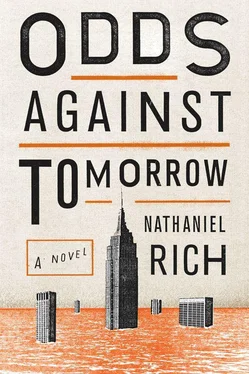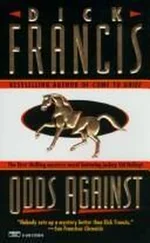“You think something bad is going to happen? Based on your research?”
Charnoble pursed his lips.
“Another attack?” Mitchell groped absently for his calculator. “What are your numbers?”
Charnoble laughed — a cold, sickly expulsion of air. “You’ll have to hire FutureWorld in order to find out. To find out what the future”—and here he took a histrionic pause—“will cost you.”
At the elevator bank Charnoble handed Mitchell a business card.
“I bet Fitzsimmons is happy with you. You must be good.”
“Equity, Assets, and Derivatives isn’t hard. It just eats your life.”
“There’s something about you,” said Charnoble. “I’m not sure if you’re aware of this, but, well, it’s your eyes.”
“Sorry. My eyes?”
“They communicate urgency. Urgency, and even fear — fear of a great danger coming on.”
“That probably explains my success with women.”
“It’s a gift I don’t have,” said Charnoble. “I can’t imitate it either. No matter how much I practice in the mirror.”
“You practice in the mirror?”
“It’s essential, in this line of work, to frighten clients. To convey a sense of implacable doom, in a manner of speaking. I’m no good at it. I come off as too cheerful or else too nervous. See, Mitchell — I know my limitations.”
Charnoble’s finger found his palm and twisted inside it.
“It’s not difficult to scare people during hard times,” he said, taking a confidential tone. “The challenge is to scare them during the hopeful times, in the lulls between catastrophic events, when FutureWorld’s services start to seem like an unnecessary luxury. When I look at you I start to believe that another disaster is fast approaching.”
“It’s late.”
“Don’t take it the wrong way. All I mean to say is, you’re a natural.”
The elevator chimed and Charnoble slinked inside. Just before the door closed, a weird lopsided smile crawled onto one side of his face. Then he was gone.
Mitchell wondered what Charnoble meant by “the wrong way.” Did business zeal make Charnoble pray for atrocity?
But half an hour later, as Mitchell sat in the backseat of the company sedan, the tinted windows muting the dawn, he wondered whether, in some hidden zone in his brain, he prayed for atrocity too. If you devoted your life to the contemplation of disaster, then wasn’t an incident-free existence an empty one? Put it this way: if you planned for disaster and none ever occurred, you were a fantasist. But if a disaster you predicted did come true, then your life had meaning. You weren’t just an expert. You were a prophet.
It was at moments like this that Mitchell’s thoughts turned to Elsa Bruner.
4.
He hadn’t needed to open the envelope, which was heavily creased and smudged with dirt, to know that it contained a bomb, or at least superfine toxic dust. He had been expecting something of this sort; given the current national mood, it was only a matter of time until next-generation radicals began mailing bombs to the country’s largest corporations. But when Mitchell flipped over the soiled envelope — was the dirt, in fact, human feces? — he saw Elsa Bruner’s name. This barely diminished his anxiety. His forefinger trembled as he tried to slide it under the crease. It was as if his finger were connected to a stranger’s hand.
His agitation multiplied with each sentence he read. The first peculiar thing he noticed about the letter, other than the fact that it was drafted in pencil, was its intimate, almost confessional tone. It was written in the voice of a lifelong friend who was resuming a conversation begun long ago. “Hi M.,” she had written.
Elsa began the letter by explaining that after her “close call” on the day of the earthquake, she had been admitted to a hospital, where she was given a heavy dose of quinidine to combat her arrhythmia. If Mitchell hadn’t called the paramedics, she might have died. She apologized for her behavior that day — she hadn’t been thinking clearly. Her fainting episode, she explained, had been caused by a rare genetic disorder called the Brugada syndrome, which she didn’t describe beyond calling it “boring.”
One might have expected the letter to end there. A thank-you note demanded no further elaboration. But elaborate she did. Elsa proceeded to update him on what had happened to her since that day. She explained that she had never returned to college and instead moved to a tiny village in Maine called Starling. Her boyfriend’s father owned property there: Camp Ticonderoga, a summer camp for boys on a horseshoe-shaped lake twenty miles northwest of Augusta. The camp had gone out of business several years earlier, and its log cabins had been yielding to the encroaching wilderness. The father had struggled to find a buyer, so he agreed to let his son and Elsa, along with several friends, convert the hundred-and-fifty-acre property into a working farm. It all seemed very convenient. Did Elsa know about the property before she started dating the boyfriend? She didn’t say.
They arrived in late March, when a fragile crust of frost still covered the ground and sheer flakes of blue ice floated in the lake like tiny glaciers. In April, under Elsa’s direction, they tilled the baseball field and planted tomatoes, squash, and cucumbers; in the riflery range they concealed a square plot of marijuana by planting rows of sunflowers around its perimeter. They played volleyball, lit giant bonfires, and had dance parties in the old assembly hall. They paddled canoes out to the raft and jumped screaming into the frigid green water. They bunked in a farmhouse that had once served as the camp’s infirmary. There was no Internet service and no cell phone reception until Augusta, which is why she had to send her letter by post.
And that was it. She signed the letter, “Goodbye, Elsa (The Fainting Girl).”
Mitchell was baffled. His first conclusion was that the letter was a request for money. Since he started at Fitzsimmons Sherman, several friends had already written to request his patronage. They never asked him outright, of course — the e-mails were always carefully oblique. They began with a couple of paragraphs of stale banter, reminiscences, and old jokes before succumbing to the inevitable: Would you like to “invest” in my noise band’s debut EP? Would you like to be an “executive producer” of my documentary film about chocolate cigarettes? Would you “subscribe” to our online literary magazine? The message was always clear enough: We’re struggling artists. You have money now. Can you give us some?
But Elsa hadn’t mentioned money. Perhaps the boyfriend’s family was providing subsidies. If anything she seemed oblivious to such concerns.
A more logical explanation was that Elsa Bruner had gone mad. The lack of oxygen to the brain while her heart had momentarily stopped was the most likely cause. It wasn’t just the “Hi M.” business, the inexplicable familiarity, that seemed off. Mitchell had also noticed egregious inconsistencies in her behavior that suggested impaired cognitive faculties. Elsa had realized, for instance, that were it not for her proximity to a first-class university medical center, she would have died during her Brugada episode. Yet now she had decided to move to a farm in Starling, Maine, of all places, some twenty miles from the nearest city. Not that Augusta’s hospital was a state-of-the-art operation — did they have any physicians who had ever treated, or even heard of, Brugada syndrome? Besides, Elsa didn’t have access to the Internet or telephones, so calling an ambulance would be out of the question. And if that weren’t enough, she was submitting herself to a frightening cocktail of activities that seemed designed to induce cardiac arrest: strenuous exercise, narcotics, and physical shock (jumping into a freezing lake). Perhaps her letter was a thinly disguised plea for help.
Читать дальше












